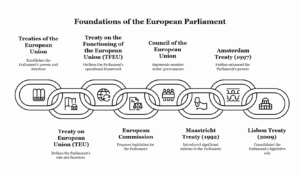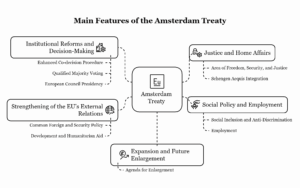-
Continue reading →: Discuss the impact of globalization on State politics in India
Globalization, the process of increasing interconnectedness and interdependence among nations and regions, has had profound implications for Indian politics, especially at the state level. Since the 1990s, when India embraced economic liberalization and opened its markets to the world, the effects of globalization have been felt across all sectors of…
-
Continue reading →: Social capital framework for studying State politics
Social capital is a concept that has gained increasing attention in political science as a means of understanding how social networks, relationships, trust, and norms within communities contribute to political participation, governance, and the functioning of democracies. In the context of state politics, social capital can be understood as the…
-
Continue reading →: Self-determination movements
Self-determination refers to the right of a people or a community to freely determine their political status and pursue their economic, social, and cultural development. Historically, the principle of self-determination has been central to decolonization movements and the establishment of new nation-states. It has also been a crucial concept in…
-
Continue reading →: The developments in Indian politics that have transformed the party system in the Indian States since the 1980s
Since the 1980s, Indian politics has undergone significant transformations that have reshaped the party system at both the national and state levels. The evolution of the Indian party system has been marked by the decline of the Congress Party’s dominance, the rise of regional parties, the increasing importance of identity…
-
Continue reading →: Critically examine the major determinants of electoral behaviour in India
Electoral behavior in India is shaped by a complex interplay of multiple factors, reflecting the country’s vast diversity in terms of caste, religion, language, region, and class. Over the years, political analysts have identified several major determinants of electoral behavior, which influence how voters make decisions in elections. These determinants…
-
Continue reading →: The reasons for the demand of Statehood
The demand for statehood in India has been a recurrent theme in the post-independence period, driven by a variety of socio-political, economic, and cultural factors. The formation of states in India after independence was based on linguistic, cultural, and geographical considerations, but over time, various regions have demanded statehood due…
-
Continue reading →: Constitutional mechanisms for resolution of Inter-State conflicts in India
Inter-state conflicts in India often arise due to disputes over resources, political boundaries, and administrative issues. The Constitution of India provides a variety of mechanisms and provisions for addressing and resolving such conflicts, aiming to maintain the unity, integrity, and harmony of the country. These mechanisms ensure that inter-state conflicts…
-
Continue reading →: Changes in the pattern of State politics in India since the 1960s
Since the 1960s, the pattern of state politics in India has undergone significant transformations, driven by political, social, and economic factors. These changes have reflected the evolving dynamics of power within states, the rise of regional aspirations, and the growing importance of identity-based politics. 1.1 Rise of Regional Political Parties…
-
Continue reading →: Various efforts made for electoral reforms since independence
Electoral reforms in India have been a key focus of political and constitutional discourse since independence. Over the years, various commissions, committees, and political movements have worked towards improving the electoral system in the country to ensure free, fair, and inclusive elections. The aim of these reforms has been to…
-
Continue reading →: Organization of Backward Castes
The organization of Backward Castes (BCs) in India refers to the collective efforts of socio-politically marginalized communities to assert their rights, gain political representation, and secure welfare benefits. These communities primarily belong to the Other Backward Classes (OBCs), a term used in Indian affirmative action policies to designate groups that…
-
Continue reading →: Politics of linguistic minorities in Indian states
The politics of linguistic minorities in India is a crucial aspect of the country’s federal structure, which is characterized by diverse linguistic groups. Linguistic diversity is one of the key features of Indian society, and the Indian Constitution recognizes this diversity by providing special provisions for linguistic minorities. The issue…
-
Continue reading →: Nature of inter-state disputes in India
Inter-state disputes in India have been a significant aspect of the country’s federal dynamics, shaping the relationship between the Centre and the states as well as among the states themselves. These disputes arise from various sources, including territorial conflicts, water-sharing arrangements, and disagreements over resource allocation, governance, and political representation.…
WELCOME!
Yearly Archive
Categories List
- biodiversity
- Canada
- culture
- democracy
- economy
- European Union
- ignou
- india
- International Relations
- nature
- news
- political-philosophy
- political-science
- sustainability
- Uncategorized
- UPSC
Tag Cloud
agriculture ai business Canada china climate climate-change conservation diversity ethics european-union farming feminism finance gandhi health history ignou india KNOWLEDGE liberty mahatma-gandhi marxism nationalism nonviolence philosophy political-philosophy political-science political-theory politics poverty PSC religion renewable-energy russia socialism sociology sustainability sustainable-agriculture sustainable-living technology terrorism travel UPSC women
Term List
- africa
- agriculture
- ai
- aristotle
- bangladesh
- bjp
- business
- Canada
- china
- christianity
- climate
- climate-change
- conservation
- critical-theory
- digital-marketing
- diversity
- ecology
- elections
- ethics
- europe
- european-union
- faith
- farming
- fascism
- featured
- feminism
- feminist
- finance
- frankfurt-school
- freedom
- fundamentalism
- gandh
- gandhi
- gardening
- gender
- gender-equality
- global-warming
- government
- health
- herbs
- history
- human-rights
- ignou
- india
- inequality
- intellectual-property
- italy
- karl-marx
- KNOWLEDGE
- language
- law
- learning
- lenin
- liberty
- lifestyle
- linguistics
- mahatma-gandhi
- marx
- marxism
- mental-health
- MPS
- multicultural
- multiculturalism
- nationalism
- natural-remedies
- nonviolence
- organic-farming
- patents
- philosophy
- political-philosophy
- political-science
- political-theory
- politics
- pollution
- poverty
- PSC
- recycling
- religion
- renewable-energy
- russia
- socialism
- sociology
- soviet-union
- spirituality
- sustainability
- sustainable-agriculture
- sustainable-living
- teaching
- technology
- terrorism
- trademarks
- travel
- UPSC
- water
- water-conservation
- wellness
- wildlife
- women
- women-empowerment





